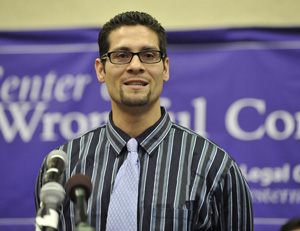
Photo via Center on Wrongful Convictions
Exonerated of murder, Juan Rivera attends a news conference.
[This story is part of a series focusing on false confessions and filming interrogations. Read other stories in the series here.]
CHICAGO--Juan Rivera’s wrongful conviction is one of the most infamous blots on the record of the Illinois justice system’s recent history. Due to coercive interrogation methods, he spent 19 years in prison for a rape and murder he did not commit before he was finally freed in January 2012. With so many exonerations in Illinois – many blamed on the notorious term of Chicago Police Cmdr. Jon Burge, known for and convicted on charges related to running a crew that tortured confessions out of mostly minority suspects – some say it’s about time some teeth were put into the state’s legal system.
Now, a new law, Illinois SB1006, requiring the recordings of interrogations in certain violent crime investigations, is intended to close the Burge chapter for good and put an end to stories like Rivera’s.
The Unrecorded Interrogations
On Aug. 17, 1992, 11-year-old Holly Staker was raped and murdered while babysitting two young children in Waukegan, Ill. Following a 10-week investigation, officers began focusing on Juan Rivera, then 19, based on a tip from an informant.
Rivera’s story is a well-known one. He had been under electronic monitoring by local police from a burglary conviction, and that monitoring showed he was at his home more than two miles from the scene when the crime occurred. There was no physical evidence linking him to the crime. But after four days of questioning, Rivera broke down. He cried, beat his head against the wall, spoke incoherently and was seemingly unaware of where he was.
 Rivera would later tell reporters that the interrogations became so intense that he would say or do anything to make the interrogators stop. Investigators prepared a typed confession and put it in front of Rivera. He signed it.
Rivera would later tell reporters that the interrogations became so intense that he would say or do anything to make the interrogators stop. Investigators prepared a typed confession and put it in front of Rivera. He signed it.
Over the course of the next 17 years, Rivera was tried three times and convicted each time – first in 1993, then 1998 and 2009. Finally, in late 2011, Rivera’s case was brought to an Illinois Appellate Court where the conviction was overturned, and the state was barred from trying Rivera again. Rivera walked out of jail, a free man, on Jan. 11, 2012.
Rivera’s interrogations were not recorded despite the availability of recording equipment in the interrogation room. Again and again, courtroom testimony about the interrogations pitted Rivera’s word against the word of the police, and the police won.
In 2003, an Illinois law sponsored by then state Sen. Barack Obama was passed mandating the recording of homicide interrogations. If Rivera had been investigated for a rape and murder under that law, his interrogations would have been recorded and his chances of never being convicted would likely have increased dramatically. But if he had been investigated on charges of rape alone, the recording equipment would have likely remained unused.
The new legislation signed into law by Gov. Pat Quinn on Aug. 26, 2013 – co-drafted by Thomas Sullivan, one of Rivera’s lawyers at the third trial and ensuing appeal – expands the 2003 law to eight more violent crimes, including predatory criminal sexual assault of a child and aggravated criminal sexual assault. State courts will render any statement regarding specified felonies (see table below) made by a suspect inadmissible unless the interrogation is audio or video recorded. The law is “a critically important next step in bringing transparency and accuracy to the criminal justice system,” according to Steven Drizin, legal director of the Center on Wrongful Convictions.
Drizin believes that although the original law was a landmark passage a decade ago, the new legislation has been a long time in coming.
“In the 10 years since the bill was first enacted, Illinois’ legislation spurred legislation in a number of other states,” he said. “And much of that legislation required recording of more than just homicides. So in a certain sense, Illinois had gotten the ball rolling but had fallen behind the times. This is a way to bring Illinois back up to the status quo.”
The new requirements, applauded in many circles but raising financial worries by some police departments, will be phased in over the next three years:
| Start Date of Recorded Interrogations | Crime |
| June 1, 2014 | Predatory criminal sexual assault of a child and aggravated arson |
| June 1, 2015 | Aggravated kidnapping, aggravated vehicular hijacking and home invasion |
| June 1, 2016 | Aggravated criminal sexual assault, armed robbery and aggravated battery with a firearm |
A Win-Win Situation
Supporters of the law claim it will provide clarity in common courtroom situations where police and suspects recount interrogations differently. Police, they say, will be discouraged from using the aggressive interrogation methods that often lead to false confessions, and suspects will find it more difficult to claim they were coerced.

Democrat State Rep. Scott Drury
The biggest concerns about the law deal not with the policy itself, but its financial and logistical details.
“The main argument that people put forward is that there’s going to be a cost,” said state Rep. Scott Drury (D-Highwood), the architect of the bill and the driving force behind its passage.“When you have recording, the argument was, you needed to get a room with a camera in it to record the interview. You need different police departments to carry out the requirements of this statute in different ways.”
He continued: “Our argument was over the long term, this is a cost-saving measure because there’s already been payouts of over $300 million related to wrongful convictions. The cost of buying recording equipment in this day and age doesn’t come close to that.”
Drury says that initial opposition to the legislation came almost entirely from law enforcement. The bill had previously been presented in multiple iterations, and the only version that was hailed as a victory by law enforcement was the cheapest one – one that made recording optional in all interrogations.
“They’re the ones that are going to have to deal with this on a day-to-day basis,” Drury said. “If something goes wrong, the recording isn’t made, there’s concern that someone who should be prosecuted won’t be. And as a former prosecutor, that’s not anything I want.”
Law enforcement officials and state congressmen worked together to eliminate some of those concerns, creating exceptions for situations where a camera malfunctions or external circumstances make it impractical to record. Now that the two bodies have reached an agreement and the law has been passed, law enforcement is hopeful that the state congress will work to obtain the funds necessary to make recording feasible.
“We supported the legislation, but with the caveat that there needs to be some way to take a look at funding because this is a costly effort,” said Laimutis Nargelenas, a spokesperson for the Illinois Chiefs of Police Association.
Nargelenas insists that the state must provide money to build a widespread recording infrastructure.
“Smaller police departments of 10 or less – which make up about 70 percent of our police departments in Illinois – don’t have that equipment,” Nargelenas said. “They try to find some type of grant money or get money from somewhere to do that besides having to raise taxes on citizens. Otherwise, the police officers have to go out and spend the money themselves.”
The gradual phasing in of the program may be an attempt to ease some of those cost-related fears. When the 2003 law was passed, there was a two-year waiting period before the law was put into practice. During that time, infrastructure was installed in interrogation rooms and trainings were conducted around the state.
Drury says that the bill will be hailed as a success from all angles once the phase-in period is complete and interrogation recording is a law enforcement norm.
“I think that the legislation, in the form that it was passed, is a game-changer,” Drury said. “The days of rogue cops and prosecutors torturing false confessions out of innocent people are finally – and thankfully – coming to an end. The statute is a win-win for criminal defendants and for law enforcement, and in that regard, I think we got it right.”
Generally speaking, a prosecutor, not the police, decide what charges will or will not be filed, only after evaluating all of the evidence and information gathered during a criminal investigation, of which an interrogation is a part. Interrogations occur anywhere from minutes to months or even years after a crime occurs. At the time of an interrogation, the police may not know the details or specific elements needed to qualify for a certain charge or for that charge to be “aggravated”. The sex crimes re particularly nuanced and specific. Seems the limited number of crimes that require recorded interrogations will lead to head scratching by police at the time of interrogations. Do we have to record this one? If we don’t, can we still get him on the lesser version of the charge? Isnt this all made easier if recorded interrogations are required for all felonies involving force or violence against another person?
Pingback: Wednesday’s Quick Clicks… | Wrongful Convictions Blog
Pingback: Illinois Hopes to Stem Wrongful Convictions with New Interrogation Law – Juvenile Justice Information Exchange | Will G. Woodard Multimedia